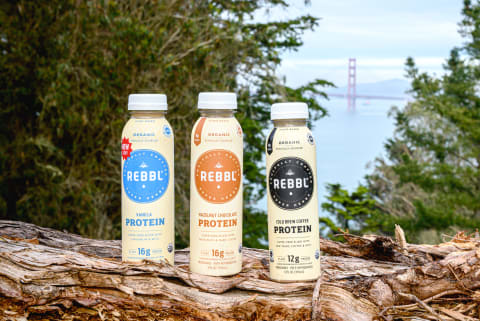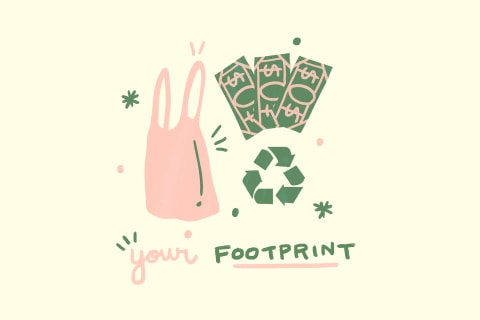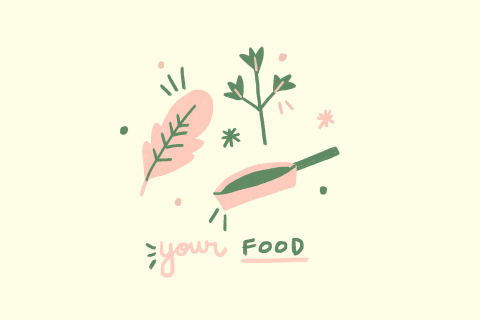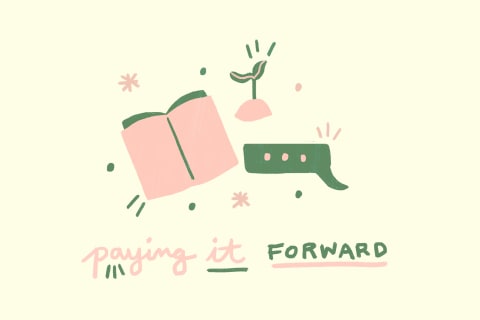Advertisement
20 Ways To Feel Good & Do Good In The World, Starting Now

These days, the word sustainability gets thrown around so frequently, it's hard to even know what it means anymore. For us, it's taking steps—no matter how small—to protect and restore the gift that is our planet. We've always believed that we can't truly be healthy if our planet isn't, and we're all about brands like REBBL that exist to heal and nurture both.

For REBBL, eating healthy and doing good are two sides of the same coin. Behind this B Corp's delicious, plant-based functional beverages are the ethical, regenerative business practices the brand was founded on, with a goal to create positive social and environmental impact around the world. (You can say that REBBL's plant-powered drinks are the ultimate feel-good elixir.)
This ethos inspired us to make a list of ways to live well and do good in our world, locally and beyond. Below, check out 20 action items that support the vision of the future we all want to see.

Shop intentionally.
It's not just about consuming less and supporting brands with practices that benefit the greater good (certified B Corps are a solid place to start). Also consider slower shipping options, waiting until your cart has multiple items before checking out, and factoring in a product's beginning and end of life as you shop (asking how and where was it made; how long will it last; can it be recycled?).
Declutter consciously.
When something's no longer of use (or sparking joy), be sure to get rid of it responsibly.
Be picky with your plastic.
Ninety-nine percent of what goes into plastic is derived from fossil fuels, a key contributor to CO2 emissions—then, it stays in the environment for hundreds to thousands of years. While it's unrealistic to completely opt out of plastic right now—especially when it comes to packaging for food safety—we can choose better types, from compostable (plastic made from plants) to post-consumer plastic (made from recycled plastic without fossil fuels). REBBL is one of the first in the industry to shift its packaging to 100% recycled and recyclable plastic bottles!
Become a recycling pro.
The rules for what's recyclable differ depending on where you live. Just search "how to recycle in [insert your city]" to check your local guidelines, and read up on the most common do's and don'ts here.
Travel sustainably.
Booking sites like bookdifferent.com can help you calculate your carbon footprint per night based on your destination and give you options for eco-friendly accommodations. If it makes sense, consider smaller-scale accommodations or even homestays to help support the local economy (think a farm stay that uses solar power, serves organic food, and employs locals).

Prioritize plants.
Eating plant-based is the healthiest diet for the planet. And the good news is it's not a diet at all but a way of thinking: Try going vegan for breakfast, instating meatless Mondays, or keeping your daily diet to 80% food from plant sources and 20% meat, dairy, and eggs. REBBL's plant-based protein drinks offer an easy morning swap or snack option.
Rethink your meat.
Make every bite of meat count: Go for food that's sourced from humanely raised animals that contain no hormones and no antibiotics. Grass-fed is better for not only the planet, but it's also better for your body.
Support regenerative practices.
Regenerative farming practices are all about restoring health to the Earth's ecosystem—helping to reverse climate change and improve our food system simultaneously. Get involved with this emerging trend by joining a regenerative-focused CSA and supporting brands that are already doing it. REBBL is based on a regenerative business model: They work with indigenous communities to source ingredients responsibly, keeping forests intact so soil can continue sequestering carbon from the atmosphere.
Organize your fridge.
To lower food waste and manage leftovers better, set up your fridge for success. Try a system like FIFO (first in, first out: New items always go to the back, and older food comes to the front to be finished stat).
Consider composting.
A smell-free option: Freeze your food scraps and drop them off at your local composting bin every week.
Map out low-waste restaurants.
Bon appétit! You might discover a new favorite.
But try more home cooking.
Less takeout means fewer takeout containers and packaging. Bonus points for shopping ingredients at your local farmers market.

Start educating yourself.
Bulk up your summer reading list with a book, or watch a documentary about an environmental issue. You'll feel informed and inspired by ideas that can help make the future a bit brighter. Make it fun by starting a book club or hosting a documentary viewing party! Need a rec? REBBL With a Cause, narrated by Ruby Rose, looks at how holistic systems can support both social and environmental justice.
Keep things circular.
Regenerative, waste-led design isn't just happening to your favorite Plant Protein Elixirs; the circular economy—aka, creating things that can be used multiple times and designing out that end-of-life step altogether—is growing in the furniture space, the fashion world, and beyond.
Invest responsibly.
Aside from making a switch to a greener energy company if it's available to you, consider where you bank and what your investments are funding (FYI, fossil fuel projects are still being funded by big banks). Researching ethical banking options and making changes accordingly is one way to help put pressure on big banks to do better.
Plant something.
If you're lucky enough to have your own plot of green space, support the local biodiversity by planting native varieties versus imported plants. This tool can give you a list of local plants, ranked by the number of species they support. Let's all help save these bees.
Lend your time.
Volunteer at a local park or beach cleanup when you can.
Consider lending other resources, too.
The effects of climate change have never been closer to home—affecting whole regions and natural wildlife—and the calls to action have never been more urgent. Many groups doing the work rely on donations to keep it up—just be sure to do some research on how to help out most effectively.
Tag a friend.
Inspire a friend to do more good along with you, and you've just doubled your impact!
Keep talking!
It's easy to feel overwhelmed when there's lots of work to be done, but if you look close enough, the needle is moving, and brands like REBBL are proof of that. Let's keep the good news front and center in our conversations and share our own personal tips and stories—because even though our actions are individual, we are far from alone.
